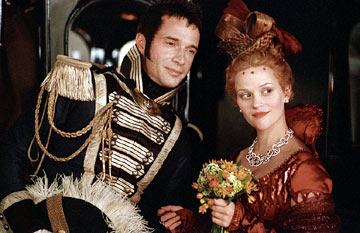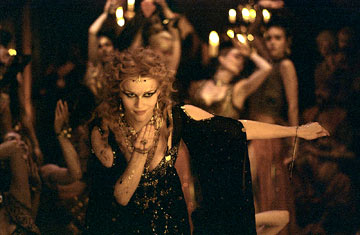

Most people will think that Vanity Fair is Reese Witherspoon's attempt to broaden her image. As an actor, especially lately, Witherspoon (Legally Blonde 2, Sweet Home Alabama) has played down her acting ability and played up her 'perkiness.' What most people don't realize is that she recently made The Importance of Being Earnest, and did lots of 'acting' earlier in her career. Vanity Fair is not the greatest move for Witherspoon, primarily because it is not much of a movie. It sure looks great, but the biting substance that made William M. Thackery's 1848 novel, originally serialized. The one thing that stands out is director Mira Nair's (Monsoon Wedding, 11'09"01) Indian heritage on the film. India was a huge part of the British Empire, but few films ever show the influences that the Indian culture has on the British.
Vanity Fair tells of Becky Sharp's (Witherspoon) rapid ascent up the social ladder in the early 1800s. Sharp was the daughter of an artist and French dancer, thereby banished to a low place in society. Through her friend Amelia Sedley (Romola Garai, Dirty Dancing: Havana Nights, I Capture the Castle), she works her way quickly up into society, leaving everybody in her wake. The novel was notable for its wicked portrayal of the upper class. Sharp was a horrible character, putting social status above her friends and family. Nair's adaptation removes much of this bite from the novel, leaving a dullish type film that moves pretty slow but looks great.
Sharp begins in the house of Sir Pitt Crawley (Bob Hoskins, Maid in Manhattan, Last Orders), where she starts as a tutor. She quickly charms the richer Lady Southdown (Geraldine McEwan, Pure, The Magdalene Sisters). She eventually marries Southdown's nephew Rawdon Crawley (James Purefoy, Resident Evil, A Knight's Tale), and then sets her sight on her very rich neighbor the Marquesse of Steyne (Gabriel Byrne, Ghost Ship, Spider). There is a whole lot of fluff in the meantime, with Amelia's betrothed (Jonathan Rhys-Meyers, I'll Sleep When I'm Dead, Bend It Like Beckham), her friend who loves her (Rhys Ifans, Danny Deckchair, Once Upon a Time in the Midlands). There are a huge number of great actors here, but the only one worth watching is McEwan, who lights up with screen with her devil-may-care attitude. Southdown says whatever she feels like saying, and because she has lots of money, nobody cares. Otherwise, nobody else is doing much. Ifans looks uncomfortable, and Rhys-Meyers is as sniveling as ever. Even the reliable Jim Broadbent (Nicholas Nickleby, Around the World in 80 Days) seems subdued. Witherspoon's performance isn't much to talk about, but that's because it, like pretty much everybody else's, was hampered by a limp script.
There is basically a whole bunch of great-looking blah, plus a very strange dance interlude. Julian Fellowes (Gosford Park) wrote the adaptation, which even stripped of its cynicism still retains a lot of relevance in today's world. Two other authors originally worked with Nair. Matthew Faulk and Mark Skeet (Morlang) wrote the original adapation which was scrapped, but their names still appear on the credits (probably not a good thing). Vanity Fair is just way too long, and not enough happens. Thanks to Nair, there is a decadent, sumptuous look to everything, but the attitude and emptiness necessary to bring out the story are missing. As it is, Sharp seems like a misguided, spoiled woman, not the cold and calculating social climber (or "mountaineer") that she should be.